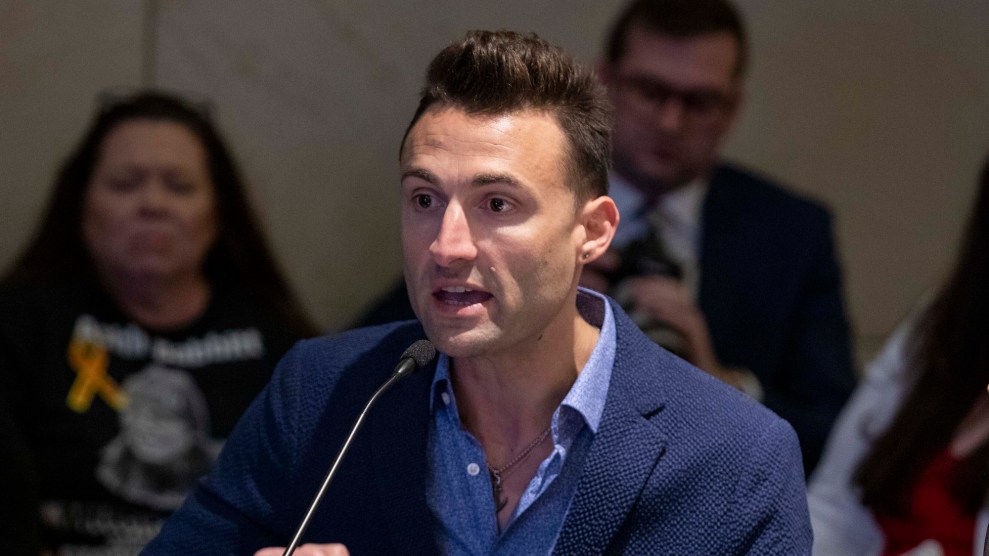
John Strand speaks during an event hosted by Rep. Matt Gaetz, R-Fla., at the Capitol.AP Photo/Amanda Andrade-Rhoades
Rep. Matt Gaetz (R-Fla.) knows that his political theater deploring the alleged abuses of the January 6 prosecutions is incomplete without the presence of a bona fide convict.
“I did nothing wrong,” said John Strand in his testimony at a “field hearing” Gaetz staged at the US Capitol Visitor Center on Tuesday—coincidentally the same day that former president Donald Trump was arraigned on federal charges in Miami.
The 12 jurors who found Strand guilty on five criminal counts related to his participation in the insurrection would take issue with his declaration. He was sentenced on June 1 to nearly three years in prison. But Strand, a former international underwear model, may have committed another transgression just by participating in the congressional panel, which included Gaetz, Rep. Marjorie Taylor Greene (R-Ga.) and Rep. Paul Gosar (R-Ariz.) By merely showing up in the Capitol, he appeared to violate a judge’s order that, while on release, he keep out of DC except for court hearings or probation meetings. In theory, he could face a new arrest for violating the release conditions.
If nothing else, Strand did commit the crime of post-conviction hubris, returning to the scene where he pushed past a fallen police officer on his way into the East Rotunda and made his way with an angry mob to the doors of the House chamber on January 6, 2021. He will soon report to a federal penitentiary in Florida.
According to mountains of evidence presented in an eight-day trial, the model-turned–anti-vaccine and “Stop-the-Steal” activist ignored the fallen officer and followed the mob right up to the House chamber door, behind which, law enforcement had guns drawn to protect the remaining members of Congress. He later climbed on a statue of Dwight Eisenhower in Statuary Hall with his girlfriend and employer, the “health freedom” activist, physician, and lawyer Simone Gold, who riled up the crowd with a bullhorn. Strand spent more than 45 minutes in the Capitol, despite orders from police to leave.
As the crowd began to force their way into the Capitol building, Dr. Simone Gold and John Strand were part of the crowd that violently pushed/pulled an officer down the stairs.
I slowed down/highlighted the pair currently being sought by the FBI.
H/T: @Cineaste_C
🎥: NyPost pic.twitter.com/nf7PGOqwJG— 𝚃𝚘𝚡𝚒𝚌 𝚆𝚘𝚘𝚍𝚎𝚗 𝚆𝚘𝚖𝚊𝚗🌙 (@Autre_Vierge) January 12, 2021
During his trial, Strand claimed that he’d been in the Capitol only to provide security for Gold, who had been scheduled to speak at a rally outside the building that day. That defense was undercut by evidence including a text message that he’d sent: “We stormed the Capitol. It was insane.”
At the field hearing, Strand participated alongside the family members of other January 6 defendants to air grievances about his prosecution. He blamed his long sentence on his refusal to take an “illegal” plea offered by the government that would have resulted in only 60 days in prison—a deal snatched up by Gold, a Stanford-educated lawyer. Strand insisted that a “flagrantly” biased DC jury had it in for him from day one. “I was denied the constitutional guarantee of a fair trial by a jury of my peers,” he told Gaetz’s panel. “This was not a random assortment of citizens fulfilling their civic duty by serving on a jury. These were people that were hanging on to every moment hoping to get chosen so that they could experience the personal gratification of crucifying someone they politically despise.” Strand also took some potshots at the judge who has the power to haul him back into court, who he said had “explicitly stated from the bench that his punishment was intensified by his resentment of my public criticisms of the government.”
Strand’s views vary by venue. When he was standing in a DC federal courtroom just two weeks ago, he tried to conjure remorse for his crimes and empathy for injured law enforcement in the hopes of winning a more lenient sentence. On Tuesday, inside the building he’d helped sack, he was unrepentant. “January 6 is fraught with alarming evidence of government instigation and involvement, government coverup, and government fraud,” he declared.
Strand appeared before the congressional panel with another January 6 participant, Brandon Straka, the former New York hairdresser who founded the #WalkAway campaign that encourages liberal Democrats to leave the party. Straka had been scheduled to speak at a rally near the Capitol on January 6. Instead, according to court documents, he’d joined a group of rioters trying to get into the building. When they grabbed a shield from a police officer trying to hold them back, he was caught on video egging them on. “Take it away from him! Take the shield!” he yelled. “Take it! Take it!”
Straka was arrested and charged with four criminal counts, including the felony of impeding law enforcement during a civil disturbance. He later pleaded guilty to one count of disorderly conduct at the Capitol and was sentenced to 90 days of home detention and three years’ probation. He spent his time at the Capitol this week testifying about the indignities he’s suffered since being arrested in 2021. Among them: losing TSA PreCheck.
Neither Strand nor Straka responded to requests for comment.
“It is outrageous,” says Michael Fanone, when informed about the rioters’ latest incursion into the Capitol. Fanone is the former DC police officer who suffered a heart attack and a traumatic brain injury after being brutally beaten and tased in the neck several times during the Capitol riot. “But to me it’s no different than having members of Congress who may have in some way assisted with the planning and preparation of the January 6 rally-turned-insurrection, or members that continue to voice support and ally themselves with these insurrectionists, continuing to walk the halls of the Capitol building.”
The presence of both Jan. 6 participants inside the Capitol this week has the potential to trigger legal problems for them. Straka’s probation conditions ban him from fraternizing with convicted felons like Strand without permission from the probation office. The judge in his case has already told Straka he could face new charges for publicly suggesting that he hadn’t committed the crimes he admitted to in his plea deal. “It’s been brought to my attention that Mr. Straka has been making questionable comments about the truth of his plea and the nature of his cooperation,” US District Judge Dabney Fredrich said at a hearing in August. “What he needs to appreciate is he is potentially incriminating himself.” She may not be pleased to hear about his return to the Capitol alongside Strand.
When Strand was released on bail in 2021, he was specifically ordered to keep out of DC entirely, except for court hearings and probation meetings. During his sentencing this month, the government requested that Judge Christopher Cooper send Strand straight to prison from the courthouse given that he’d been at large since his trial in September. But Cooper allowed Strand to self-surrender to the Bureau of Prisons at a later, as yet undetermined date. In Florida, where he’ll serve his sentence, Strand now lives in a $3.6 million house with Gold. Cooper indicated that the pretrial release terms would still apply until Strand reported to prison.
The federal probation office did not respond to questions about whether Strand’s Capitol visit violated his release conditions or would likely trigger a new arrest. US Capitol Police did not respond to a request for comment on whether they were aware of the January 6 convicts’ presence in the Capitol. Gaetz’s office also did not respond to a request for comment. The US Attorney’s Office for the District of Columbia declined to comment. But Fanone, who years ago also worked as a Capitol Police officer, says that the Capitol Police could use the video from the field hearing as evidence to obtain an arrest warrant for Strand for violating the DC stay-away order.
Strand and Straka wouldn’t be the only January 6 convicts whose remorseless post-sentencing behavior might call for additional scrutiny by a judge. But so far, Fanone thinks federal judges have been giving some of the Capitol insurrectionists “wide berth when it comes to some of their violations, especially when it falls into that gray area, and I use this term loosely with air quotations, freedom of speech.” But he thinks that’s starting to change. “I think they’re starting to recognize that a lot of these guys are full of shit,” he said. “They go before the judges pleading regret and then moments later, they’re out in front of the courthouse addressing right-wing media and telling them how they remain defiant, they would have done it again, and they’re awaiting Donald Trump’s pardon.”
HEARTBREAKING: Witnesses at the Field Hearing on January 6th describe how they’ve been targeted, smeared, and jailed by our weaponized government 👇@BrandonStraka@JohnStrandUSA@JeffClarkUS pic.twitter.com/Zq1m5JL83e
— Rep. Matt Gaetz (@RepMattGaetz) June 14, 2023
If Strand does run into trouble for returning to the Capitol this week, he will have some help from a new lawyer. During his trial, Strand was represented by a court-appointed lawyer, an arrangement usually reserved for indigent defendants. Apparently, he now has deeper pockets. As soon as Strand was sentenced, a new private lawyer joined his team and quickly filed an intent to appeal. That lawyer, Nicholas Smith, was appointed by the court to represent one of the Proud Boys in their recent sedition trial. When I reached him by phone, he quickly hung up, saying it was a bad time to talk. He did not respond to an email seeking comment.
Smith may have been busy with his new client. This week he filed a motion asking the court to amend Strand’s pre-sentencing report to reflect the fact that Strand has an alcohol abuse problem and would like to seek treatment in prison. “At the time of Strand’s arrest in January 2021 he had developed a habit of consuming four to five alcoholic beverages a night almost every day of the week,” Smith wrote. “Strand abused alcohol to cope with anxiety and depression. His addiction continued untreated after his arrest.” (The motion also asks the judge to include Strand’s medical conditions in the report: vasovagal syncope—i.e., fainting at the sight of blood—and plantar fasciitis, a chronic foot scourge any runner will recognize, and one likely not helped by wearing the silver loafers and other stylish footwear Strand has sported in court.)
Alcohol abuse never came up during Strand’s trial or sentencing. For prosecutors, the motion may have appeared to be an effort to get Strand into a cushier federal prison program and do an end-run around the judge to secure a shorter sentence. In a filing, they objected to his request because it could impact his eligibility for a sentence reduction through the Residential Drug Abuse Program. Inmates in that program are sent to a special residential part of a prison where they spend their time in drug treatment and educational or work activities. The Bureau of Prisons is allowed to reduce the sentence of a nonviolent offender who completes the program by as much as a year. “The motion thus appears to be Strand’s latest attempt to manipulate the Probation Department and the Court,” the prosecutors write. “It should be denied.”
After the field hearing, Gaetz spoke to a gaggle of reporters and said the event had helped accomplish his goal of challenging the government’s narrative about January 6. “We’re trying to correct history,” he declared.
Update, June 26: This story has been updated to better reflect the type of representation Nicholas Smith provided to a Proud Boy.
















